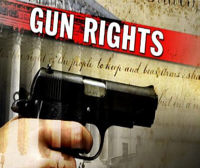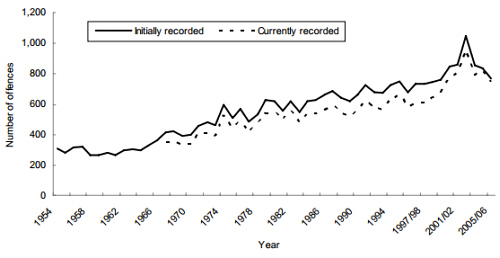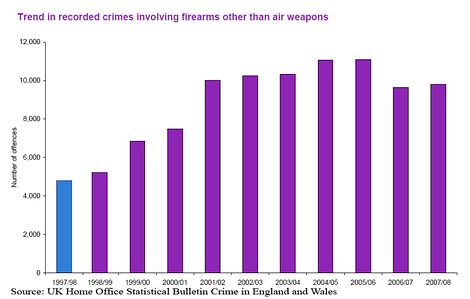

Applying Technical Analysis To Gun Control …
A Trader's Perspective on Reducing Violent Crime
![]()
By Dustin Pass, December 21, 2012
Article source

Gun Control Analysis
Anytime you develop or implement a strategy as a trader, you have two primary datasets that you are working with. The first dataset would be the criteria of your strategy you are implementing. Essentially the rules that make up your trading strategy. The second dataset is the outcome. In trading, we will define a positive outcome as being the goal of our strategy and that outcome would equal overall profitability.
If we do not like the outcome of our strategy results, we have to adjust the strategy rules. Most traders are using either a proven strategy, i.e. it's been used in the past and has worked, or they have taken a proven strategy and made adjustments. I am not aware of any traders looking to implement strategies that have failed historically to produce positive results. As traders, we just look past those and continue searching for strategies that have met our desired outcome.
I thought it would be interesting to approach gun control in a similar fashion, so I decided to define the two datasets. I started with the outcome and worked backwards. My goal for the outcome of the second dataset is to reduce violent crimes. The first dataset would be the strategy we take, i.e. the rules or "laws" implemented around guns -- how and where they can be possessed.
Now that we have our datasets for this experiment, we need to take a look at some strategies for both sides of the fence. I searched for countries with strict gun control laws as well as countries more extreme in the other direction.
My search landed me on two different countries. I ended up finding one that has very strict gun control laws and one on the entire other side of the spectrum. In fact, that country has the largest number of guns in circulation per 100,000 citizens. It was difficult to find countries extreme to the side of having guns, hence I describe only one example of each of the datasets.
The countries I landed on were the UK and Switzerland.
We will start with the United Kingdom. Their gun control laws resulted from another horrible massacre very similar to the one we as Americans are currently enduring. Its roots go way back, but the straw that broke the camel's back so to speak was when a 43-year-old man entered a school with four handguns, killing 16 children and one adult before committing suicide. This massacre occurred in 1996, and led to the passing of the Firearms (Amendment) Act of 1997 which banned all private ownership of handguns in the UK. So that Fire Arms Act of 1997 is our rule set.
Now we will look at our output or result. Let me start by saying the crime rates in the UK were very low already, and there is a huge debate over how reliable the governmental statistics are, many believe they have skewed the numbers to be less crime after the gun ban, but here is what I found.
Homicide Offenses recorded by the police in England and Wales 1954 to 2005/06

UK Homicides Related To Gun Ban Source UK National Archives [1] - pic label
As you can see, the desired outcome was not experienced. We were looking for a decrease in violent crimes, and ended up getting an unexpected outcome. Like trading, this is beginning to provide some factual information that is somewhat unexpected.
Have you ever had a strategy you just knew would work, but when you applied it, despite your strong belief that it would work, it just fell flat? I am feeling a little like that. I thought for sure if we banned guns it would reduce crime. I think we should keep looking.
Let's break this down to just firearm crimes.

Crimes Involving a firearm post ban. Source UK Home Office Statistics [2]
This graph was released by the UK Home Office in a statistical bulletin. Although I don't blame the results on the gun ban, it's clear this rule set did not give us the outcome we were after. As you can see, crimes involving guns actually increased quite a bit. In fact, based on these numbers, it looks like the rate of violent crimes where a gun was present more than doubledfrom the 1997 (gun ban year) to 2002. It's starting to look like only honest people are following the laws.
Before we move on to Switzerland, let's look at one more number.
53% … That is the number of burglaries in the UK that occur while occupants are at home. This number, compared to 13% in the US, is an interesting number. One has to wonder if it's due to UK criminals knowing they will face minimal opposition and are less concerned with timing their intrusions. Unfortunately, not only did burglaries increase, but rape cases and a number of other non-fatal crimes escalated quite a bit after the gun ban went into effect, in addition to the increase in gun-related violence.
There is no way to definitively tell if this increased crime was due to the gun ban, but one can reasonably assume it was. In fact, many seem to believe so. Just look at a fact list put out by Yahoo Business:
- "In the four years from 1997 to 2001, the rate of violent crime more than doubled.
- Your chances of being mugged in London are now six times greater than in New York.
- England's rates of assault, robbery, and burglary are far higher than America's.
- 53 percent of English burglaries occur while occupants are at home, compared with 13 percent in the U.S., where burglars admit to fearing armed homeowners more than the police."
A study by Gary Kleck and Marc Gerts from the Journal of Criminal Law & Criminology [3] boasts some interesting information regarding armed resistance and its impact on crime. Their study states that in America, gun ownership protects 65 lives for every 2 lives lost, which would further explain the increase in crime in the UK after the gun ban.
Let's get back on task here. In my trading, if I make a strategy change and see a correlating change in my outcome, I would have to base my decision to continue or end the implementation of that strategy on the data available, rather than on speculation.
In the case of the UK gun control ban, the outcome was not desirable. In fact, not only did it fail to accomplish my goal of decreasing gun-based crime, it actually increased it … along with several other types of crimes.
Let's look at another strategy. We are going to look at the complete opposite side of the spectrum. Switzerland is one of the few countries I could find with firearms so deeply rooted within their culture, that every Swiss man will at some point own and be trained with a fully automatic weapon.
This is quite the extreme, as they do not have a military … but the government instead chooses to arm their citizens with fully automatic weapons as part of a citizen militia and train them accordingly. You read that right, fully automatic weapons.
The country has a population of about six million, and at any one time close to 20% of the citizens will have a fully automatic weapon or handgun. Another 25.7% have some other type of firearm, meaning almost half the Swiss population has a gun!
After hours of searching, I could not find any clear data on Swiss crime, outside of what is available on Wikipedia (which only covers about 5 years).
A BBC news article cites: [4]
"Guns are deeply rooted within Swiss culture -- but the gun crime rate is so low that statistics are not even kept …
…but despite the wide ownership and availability of guns, violent crime is extremely rare. There are only minimal controls at public buildings and politicians rarely have police protection.
Mark Eisenecker, a sociologist from the University of Zurich told BBC News Online that guns are "anchored" in Swiss society and that gun control is simply not an issue."
Although we don't have a "before and after" to look at since the Swiss have always been a gun-filled society, we can simply look at the outcome as being the end result, i.e. low crime.
When trading, sometimes you come across a strategy that works as is. Meaning you do not have to adjust it or make any changes, so you end up not having any new data points to compare. It would be like trading a strategy with the goal of generating 10% a year in mind and being profitable right out of the gate at the desired rate. Why would you change anything, right?
I have tried to keep my sources in the .gov and .org area to keep any of the tabloid type content from creeping its way into this article. My goal was to assess the options for gun control in the same way I would assess the options for a trading strategy, and make my decision based on the outcome, not emotion. It is amazing how close of a relation this topic is to trading.
One of the biggest problems people have with finding success in trading is controlling their emotions, and I think the way most people are coping with the current gun control issues are very similar to how many failed traders have dealt with trading. They make mistakes based on fear and greed, and I hear a lot of that in the gun control debate.
I just read a post from someone about their experience as a kid in high school, and how they were so scared of guns they would think about where they would hide if a gunman came into their classroom. They talked about how they were shaking their fist in anger at the current gun control laws or lack thereof.
Although these are understandable emotions to have, this emotional reasoning is filled with anger and fear. They have no place in the creation or implementation of policy. Careful study and methodical planning is the reaction this requires. Not an emotional knee-jerk reaction brought on by fearful people.
I will leave it to you to choose which trading strategy you would employ. If you are from the UK or Switzerland, I would love to hear from you. Let us know from a standpoint of experience how the gun laws in your country have affected crime. I would be interested to read some firsthand responses from citizens of these two countries.
I would also be extremely grateful if you would like, share, or tweet this article to your friends and colleagues.
[1] Uk National Archives | [2] Uk Home Office Statistics Bulletin | [3] Journal of Criminal law & criminiology | [4] BBC News Article
![]()



































